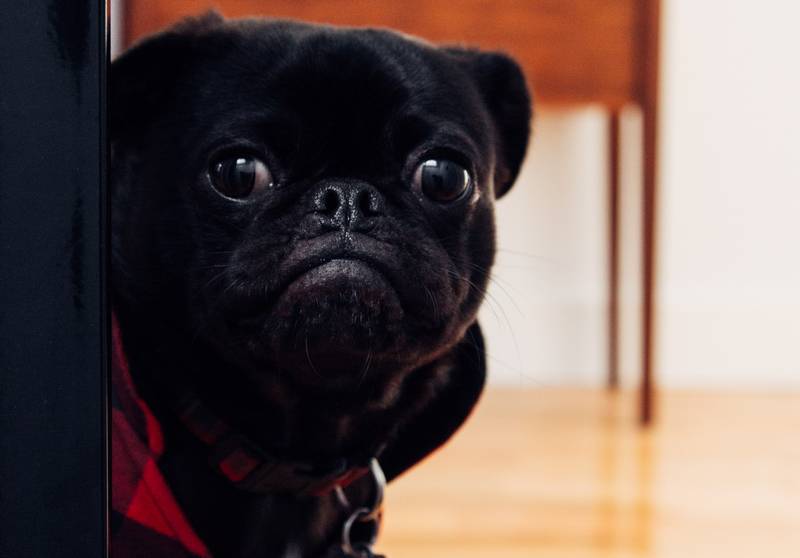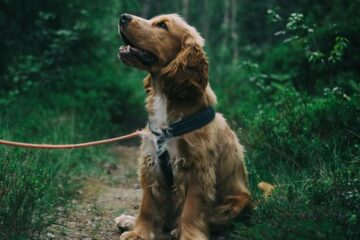Dog Hides When in Trouble
What makes your dog so worried when they get in trouble? Sure, you’re upset, but they don’t need to run and hide from you. Why do dogs hide when they are in trouble? And what if you can’t find them? Where does your dog hide when he is in trouble? How do dogs say sorry? Do dogs remember punishment?
Today, we’re going to answer all of the questions you have about this concerning issue with your dog. And we’ll of course tell you how to stop your dog hiding when in trouble once and for all. Soon, this frustration will all be behind you. Keep reading below for our article “Dog Hides When in Trouble!”
Why Do Dogs Hide When They Are in Trouble?

Dogs hide when they are in trouble because they’re scared and feeling anxious. Hiding somewhere small and secluded makes them feel safer because dogs are descended from wolves, and this reminds them of being a closed-off den. Being away from you helps calm them because in their eyes it prevents them from getting punished.
Ensure that you and anyone else who spends time with your dog is not taking punishments too far. Never strike your dog, and you should not yell either. Getting loud and upset with your dog will only make their struggles with anxiety worse, and does nothing to address what caused the misbehavior.
It’s possible that no one in your home or who currently interacts with the dog has been improperly disciplining your dog, but someone in the past may have. Be particularly careful about raising your voice or getting upset at shelter dogs when they do something wrong.
Reacting too strongly when your dog is in trouble will only make them hide more often and in more closed-off spots, and may even cause them to run away. A dog that once only hid under the table may now become a dog hiding under the bed, hiding under the couch, or even going outside and hiding under the house.
Obviously, you can’t allow misbehavior to go on, but you don’t want your dog’s struggles with anxiety and worry to get worse. To help give your dog confidence, while also getting them to stop hiding when they’re in trouble, skip to the last section now.
Where Does Your Dog Hide When He Is in Trouble?
Your dog hides when he is in trouble in areas that are small and closed-off that feel like a den. Being descended from wolves, dogs instinctually seek out areas like these when they are stressed or feeling scared. In addition to being in trouble, your dog could hide because of a move to a new home, strangers coming over, or a loud thunderstorm.
If you know something has happened that will scare or worry your dog, look for them in these types of areas. You’ll probably find your dog in a closet or hiding under something. Be careful about closing the raised legs on a couch or a recliner during these times, as many dogs can slip under there without being noticed.
How Do Dogs Say Sorry?
Dogs say sorry through physical signs such as dropped ears, wide eyes, putting their tail between their legs, slowly wagging their tail, or gently rubbing against you. Anything that could be viewed as submissive is a way of your dog showing that they are sorry. They are telling you that they know they made a mistake, and they recognize that you are in charge.
Do Dogs Remember Punishment?
Dogs do remember punishment. But it’s important that you use only constructive punishments such as brief time-outs in combination with positive reinforcement of good, desired behaviors. Teaching your dog what to do by rewarding them will be significantly more effective and create a better relationship than punishing your dog will.
How to Stop Your Dog Hiding When in Trouble
To stop your dog hiding when in trouble, you need to ensure that you’re teaching your dog what to do by showing them positive reinforcement of the desired behavior. Rather than punishing them repeatedly and yelling when they do something wrong (which makes them scared and causes them to hide), instead show them the correct thing to do and reward them when they do.
For example, if your dog is lying somewhere that they shouldn’t be, don’t get angry and force them to move. Just withhold attention, and then when they lay somewhere appropriate (like on their bed), reward them with praise and treats. Positive reinforcement is incredibly effective and fosters a great relationship with a confident, anxiety-free dog.
But you’ll still need to do something about the root problem that was causing them to be so scared and filled with worry to begin with, which is your dog’s strong feelings of anxiety. Letting this continue unaddressed will just lead to your dog’s issue growing and escalating into other behavioral problems.
To properly address that, we must first talk about what makes dogs tick and has for thousands and thousands of years now. You’ve probably heard before that dogs are pack animals, and that in every pack there is a pack leader.
But every time that your dog hides when they’re in trouble or shows a lack of confidence, they are without a doubt showing you that they have no trust for you as the head of the family pack.
If they did, they wouldn’t get scared so easily. They wouldn’t engage in any other types of anxiety-related behavior or disobedience. And they would listen to your commands at all times — happily — and they would do so immediately.
Show your dog that you are not just their pack leader, but a capable and deserving one who can handle everything, and you’ll make all of these terrific things your reality.
You’ll be better off for obvious reasons. But your dog will be too because you’ll have freed them from all of the anxiety and fright that their confidence issues are currently burdening them with 24/7.
Sounds wonderful, don’t you agree?
“Yes, sure, but how do I do this then?”
You should watch a wonderful free video series by a renowned trainer named Dan which is on this very subject: how to be your dog’s pack leader. In Dan’s series, he explains absolutely everything in ways that are very simple to understand and teach to your own dog, and he gets immediately to the point so that you can start seeing these critical changes in your dog before things get any worse.
Start watching Dan’s free training series now by clicking here. And don’t worry, because no, you’re not going to have to be mean or yell at your dog. Dan uses only 100% humane and loving teaching methods at all times. Not just because they’re the right thing to do, but also because they’re the fastest way to achieve permanent changes in your dog’s behavior.
I’m sure you’re sick of trying to find your dog every time they get scared, so I’ll let you begin now. Best of luck with everything, and we hope you found our article “Dog Hides When in Trouble” helpful!





